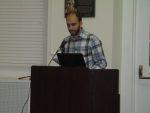Mt. Kisco Solar Power Law Debate Centers on Sensitive Districts

A controversial proposed law to regulate the placement of solar panels in Mount Kisco has drawn opposition by several solar power supporters because it would allow installations in the Conservation and Preservation districts.
While Mount Kisco already allows roof-mounted panels, the legislation places certain criteria on those systems. It is currently silent on the ground-mounted systems.
The legislation would give the Building Department the latitude to approve ground-mounted panels on systems less than 1,000 square feet. Ground-mounted arrays larger than 1,000 square feet would require the Planning Board to grant a special permit. The smaller systems would be permitted on non-residential properties while multiple zones would be allowed to have systems of more than 1,000 square feet.
While most residents at a more than two-hour public hearing last Monday said they supported the concept of generating more solar power, many expressed concerns that ground-mounted systems would appear in areas that have been set aside for open space and historic trails, most notably the Conservation and Preservation districts.
Resident Brian Liebman said he was troubled about Oakwood Cemetery, which is in the Preservation District. He called the property “one of the most beautiful and serene locations in town.”
Mount Kisco Mayor Gina Picinich said she was aware of opposition to allowing systems of more than 1,000 square feet in the two districts. There are five parcels in the Preservation District owned by entities other than the village – Oakwood and St. Francis cemeteries, an undeveloped parcel near the end of Radio Circle, Marsh Sanctuary, which has deed restrictions, and a portion of Mount Kisco Country Club, she said.
Picinich said officials have no plans to place solar panels on the historic trails owned by the village. Village trustees already approved a project for ground-mounted panels at a capped landfill on village-owned property at Lincoln and Columbus avenues. Officials are also considering a plan for a community solar project on a portion of Oakwood Cemetery.
Conservation Advisory Council (CAC) Chairman John Rhodes said large solar farms should be prohibited in protected lands. The legislation represents “a major change in the village’s basic zoning law and in our basic land-use approach,” he said.
While the CAC supports solar power, Rhodes said panels should be limited to rooftops and backyards with small ground-mounted arrays.
Another CAC member, Jim Gmelin, said he wants greater use of solar power and other forms of renewable energy. Because of concern for the preservation of trees and open space, environmental protections should be included in the measure, he said.
Picinich said those who raised concerns against the legislation are volunteers who are dedicated to preserving village-owned green space.
“This board has no thought or intention of detracting from their efforts,” Picinich said. “We value their contributions and are confident we can work together to find a suitable compromise.”
Bedford resident Ellen Conrad, co-founder and co-president of Bedford 2020, favored the legislation. The law would encourage renewable energy sources and protect the environment, she said.
“It reduces greenhouse emissions and preserves natural resources,” said Conrad, adding that rooftop solar panels cannot be used by renters and aren’t feasible in shady areas.
Village resident Doug Hertz, the president of Briarcliff Manor-based Sunrise Solar Solutions who is also the Planning Board chairman, is seeking to develop the solar power system at Oakwood Cemetery. The application is being reviewed by the Planning Board’s remaining members.
Solar would reduce greenhouses gases and lower the village’s carbon footprint while reducing the cost of energy, Hertz said.
“Mount Kisco should embrace renewable energy and community solar,” Hertz said.
Trustee Peter Grunthal, a longtime solar power supporter, said a balance between environmental protection and generating more energy is needed. Trustee Karen Schleimer added that the board should take time to carefully review the legislation.
Picinich said she hoped any law would serve as a model for other communities.
The hearing is scheduled to continue at the Village Board’s Oct. 1 meeting at 7 p.m.
